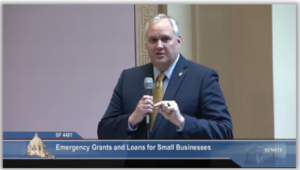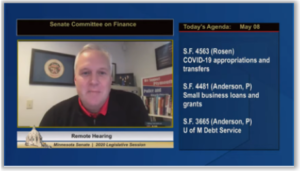Dear Friends,
We are in the final week of the 2020 Legislative Session with our constitutional adjournment date of Monday, May 18.
Our days at the Capitol for those of us who are here are filled with daily floor sessions, calls, virtual meetings, and plenty of social distancing.
Over the past week we passed several pieces of legislation including a bipartisan bill authorizing $17 million in additional elections security dollars, and my bill extending relief to small businesses experiencing financial hardship due to the COVID-19 crisis.
Work continues on a range of other legislative priorities including a potential bonding bill, which I am hopeful we can pass and provide much needed economic stimulus in the form of critical infrastructure, roads and bridges, and other needed projects across the state of Minnesota.
Please take a few minutes to read some of the highlights and updates from the past week.
Support for small business
Today, the Minnesota Senate passed my legislation to appropriate $60million for small businesses in crisis because of the stay at home orders and coronavirus pandemic. The bill was passed with bipartisan support, 59-7.
Every community across Minnesota has been affected by the pandemic’s devastating economic impact. These grants won’t meet every need and certainly can’t make up for the hardships our small businesses have endured, but we are throwing a lifeline to help them get through this challenging time.
A business is eligible if it has a brick and mortar location in Minnesota, is owned by a permanent resident, employs 50 or fewer full-time staff, and can demonstrate financial hardship as a result of COVID-19. Once approved, eligible businesses may receive grants of up to $10,000 to use for working capital to support payroll expenses, rent, mortgage payments, utility bills, and other similar business expenses.
The bill designates $30 million to be distributed to businesses in Greater Minnesota and $30 million for distribution in the seven-county metropolitan area. At least $18 million of the funds would be designated for microbusinesses of 6 or fewer employees, and, a minimum of $15 million must be awarded to minority-owned, veteran-owned, and women-owned businesses.
We carefully crafted this bill over the past two months to appropriate the funds to those who need it most and to have the broadest impact across the state. Everyone is hurting right now, so we’re responding by passing the bill today with simple and broad guidelines to get vital resources to as many small businesses as possible.
My hope and prayer is that the Governor and House will pass the bill and we can get the much needed assistance to our small businesses who are simply hanging on by a thread.
You can read the full release on the passage of the bill, here.
Revised Budget Forecast
Last week, Minnesota Management and Budget (MMB) released a revised budget forecast for FY 2020-21 biennium, in light of the COVID-19 economic impacts.
Minnesota’s budget and economic outlook has significantly worsened since the coronavirus pandemic.
Back in February, MMB estimated a $1.5 billion surplus. MMB now forecasts a budget deficit of $2.426 billion due to decreased revenues and increased government spending in response to COVID-19.
Fortunately, Minnesota is in a stronger financial position than many other states around the country and is better positioned to weather the economic storm. There are currently $2.359 billion in the budget reserve.
As we finish the 2020 legislative session, and look to 2021, serious conversations need to be had, restraint for any new spending must be a priority, and some difficult decisions will have to be considered in all areas of the state budget in the future.
For more information on the May 2020 Interim Budget Projection, you can click, here.
Additional Election Security Funding
Last Thursday, the Senate approved more than $17 million of Help America Vote Act (HAVA) and CARES Act funds to secure and protect our elections. The bill passed with overwhelming bipartisan support.
Despite the pandemic, elections are fast approaching. It is particularly important now that updated voting procedures are established so Minnesotans continue to have access to secure elections. Security of the upcoming elections will not only be defined by ballot integrity, but also by health and safety protections for every voter and volunteer throughout the process. This bill clarifies our election process to fit these times.
Roughly half of the funds can be used for any COVID-19 related needs such as temporary screens, cleaning and sanitizing supplies, protective equipment, and social distancing compliance, including extra staff to manage an expected increase of mail absentee ballots. The other half of funding can be used to more general election needs, including updating the Statewide Voter Registration System, election accessibility, and improved election security.
In addition to the funding, the bill allows for the one-time relocation of polling places by July 1, 2020, to protect vulnerable populations. Locations usually need to be finalized before the end of the year previous to an election. The bill also allows the electronic filing of an affidavit of candidacy and electronic signatures for nominations petitions.
Finance Committee
This past Friday I joined a virtual meeting of the Senate Finance Committee to discuss two of my bills, Senate File 4481, and Senate File 3665.
Senate File 4481 passed the Finance Committee unanimously, and was passed by the Senate body earlier today  by a strong bipartisan vote of 59-7.
by a strong bipartisan vote of 59-7.
Senate File 3665 would authorize the University of Minnesota to refinance debt to construct the Biomedical Discovery District buildings on the Twin Cities campus.
It would further allow the University to capture these savings from the refinancing, and apply them to the design, site acquisition, and preconstruction of the Clinical Research Facility – also on the Twin Cities campus.
Our current health crisis shows clearly the benefit of clinical research and the quick connection between disciplines.
For example, the University’s low-cost ventilator was created through an idea of a physician – brought to life by engineers. Serology testing is a collaboration of biomedical scientist and faculty in the College of Veterinary Medicine. The University’s Medical School faculty have quickly launched four clinical trials to develop new treatments for COVID-19. We have four funded rapid response grants and a broader project underway to test theories for a vaccine.
The new Clinical Research Facility will connect a broad array of clinical research units and activities from across the University – providing a consolidated home for the Clinical Translational Science Institute – and providing new patient-centered clinics that facilitate patient participation in clinical research.
This legislation will both authorize the University to refinance the bonds – as well as use the savings on the CRF project – thereby taking a project off the University’s legislative request list without the issuance of additional general obligation bonds.
AmeriCorps Opportunity
Do you know anyone 18+ years old and looking to serve their community this summer?
Encourage them to consider applying to become an AmeriCorps member as part of the Minnesota Emergency Response Initiative.
ServeMinnesota’s Senior Community Services will be participating in the AmeriCorps Emergency Response Initiative this summer to help communities respond to the COVID-19 crisis.
AmeriCorps members receive a living stipend, health insurance and an education award to help pay for qualifying higher education expenses. Apply before May 20 here: https://www.servetogrow.org/response
Governor’s Executive Orders
Governor Walz signed several new executive orders last week related to the ongoing COVD-19 situation.
Executive Order 20-49 Allowing food trucks to operate at highway rest areas in Minnesota during the COVID-19 peacetime emergency.
Executive Order 20-50 Ensuring emergency government assistance and stimulus payments cannot be garnished except for domestic obligations.
Executive Order 20-51 Establishing guidance for re-opening elective medical procedures.
A full list of the Governor’s executive orders relating to the COVID-19 crisis can be found here.
Closing Thoughts
Thanks for reading this week’s update.
If there is significant news made at the legislature in these final days, I will do the best to send out an update.
Please continue to stay safe and follow the guidance from the experts.
As always, please reach out to my office if we can be of service.
You can reach me with your concerns and questions at 651-296-9261 or reach me by email at sen.paul.anderson@senate.mn.
Stay well.
Sincerely,
Paul T. Anderson
